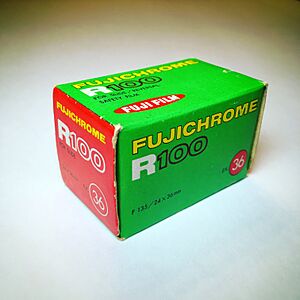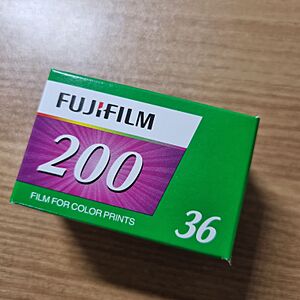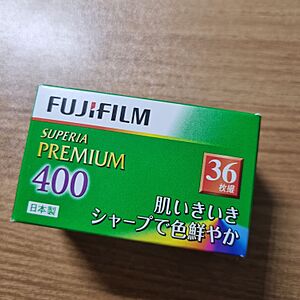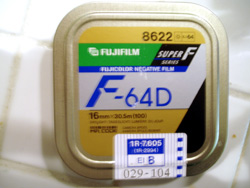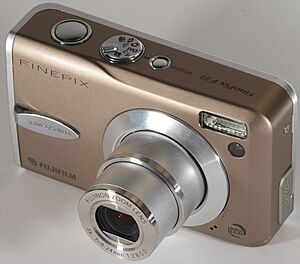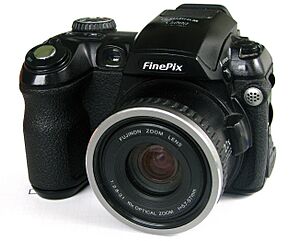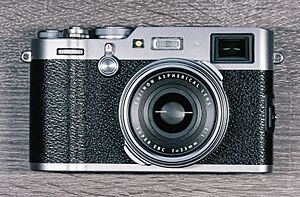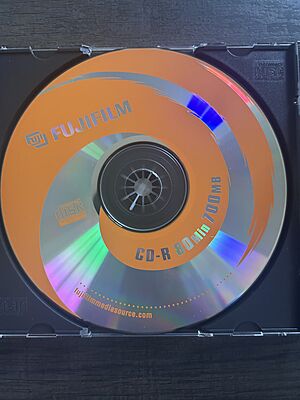Fujifilm facts for kids

Logo used from 2006
|
|
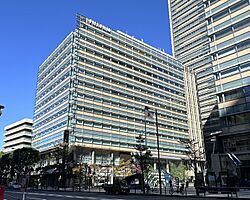
Headquarters at Tokyo Midtown in Minato, Tokyo
|
|
|
Native name
|
富士フイルムホールディングス株式会社
|
|---|---|
|
Romanized name
|
Fuji-fuirumu Hōrudingusu kabushiki gaisha |
|
Formerly
|
Fuji Photo Film Co., Ltd. (1934-2006) |
| Public | |
| Traded as |
|
| Industry |
|
| Founded | January 20, 1934 |
| Headquarters | Midtown West, Tokyo Midtown Akasaka, Minato, Tokyo, Japan |
|
Area served
|
Worldwide |
|
Key people
|
|
| Products |
|
| Revenue | |
|
Operating income
|
|
| Total assets | |
|
Number of employees
|
73,906 (2019) |
Fujifilm Holdings Corporation, often called Fujifilm or just Fuji, is a big company from Japan. Its main office is in Tokyo. Fujifilm makes many different things. They work with photography, optics (like lenses), office and medical electronics, and even biotechnology.
The company first started by making photographic film. They still make film today! But Fujifilm also creates many other products. These include equipment for hospitals, cosmetics, and even medicines. They also make things like photocopiers, printers, and digital cameras.
Fujifilm is part of a large group of companies called the Sumitomo Mitsui Financial Group.
Contents
The Story of Fujifilm
How Fujifilm Started
Fujifilm began in 1934. It was first called Fuji Photo Film Co., Ltd. The company started by making photographic films.
In the 1940s, Fuji Photo began making optical glasses, lenses, and other equipment. In 1962, Fujifilm teamed up with a UK company called Rank Xerox. Together, they created Fuji Xerox Co., Ltd.
Growing Around the World
From the mid-1950s, Fujifilm started selling its products in other countries. In the 1980s, the company grew its production and operations worldwide.
During this time, Fujifilm also developed new digital technologies. These were used for photography, medical equipment, and printing. For example, they invented a new way to take X-rays called computed radiography (CR). This helped reduce radiation for patients and technicians. Fujifilm sold these systems under the FCR brand.
Business Challenges
For a long time, Fujifilm was a top company for camera film in Japan. In the US, they became more popular by sponsoring the 1984 Los Angeles Olympics. They also offered cheaper camera film and built a factory in the US.
In the 1990s, Fujifilm faced challenges related to business practices. The company decided to stop certain payments, which led to difficult situations. Later, in 1995, another big company, Kodak, complained about Fujifilm's business in Japan. This led to a big business disagreement that was handled by the World Trade Organization. In 1998, the World Trade Organization decided in favor of Fujifilm.
Fujifilm in the 21st Century
In 2006, Fujifilm made a plan to create a main company called Fujifilm Holdings Corp. Fujifilm and Fuji Xerox became parts of this larger company.
In 2018, Fujifilm planned to buy a large part of Xerox. However, this deal did not happen. Later, in 2019, Fujifilm bought Xerox's share in their joint company, Fuji Xerox. This made Fuji Xerox a fully owned part of Fujifilm.
In December 2019, Fujifilm also bought Hitachi's business that makes medical imaging equipment.
During the COVID-19 pandemic in 2020, one of Fujifilm's medicines, called favipiravir (Avigan), was considered as a possible treatment for the virus. It was approved by some countries.
In June 2020, Fujifilm invested a lot of money to make more medicines in Denmark. They also showed a new type of magnetic tape that could store a huge amount of data, up to 400 TB.
Fujifilm's Family of Companies
Fujifilm has many companies that work together. These are called subsidiaries.
- Fuji Xerox was a joint company with Xerox. After 2019, it became fully owned by Fujifilm. In 2021, its name changed to Fujifilm Business Innovation Corporation.
- Fujifilm bought Sericol Ltd. in 2005. This UK company makes printing inks.
- Fujifilm de México is a Fujifilm company in Mexico. It has been recognized as one of "The Best Mexican Companies" for several years.
- Fujifilm also works in medicines through companies like Fujifilm Toyama Chemical and Fujifilm Diosynth Biotechnologies.
As of July 2020, the Fujifilm Group has two main operating companies. These include more than 300 smaller companies!
What Fujifilm Makes

Fujifilm makes a wide range of products. Here are some of them:
Photographic Film
Fujifilm is famous for its photographic films.
- Fujichrome films are for slides.
- Velvia: This film makes colors very bright and clear. It's popular for nature photos.
- Provia: This film gives more natural colors than Velvia.
- Fujicolor films are for printing photos.
- Superia: This film is great for everyday photos.
- Fuji Neopan Professional films are for black and white photos.
- Instax films are instant films for Fujifilm's instant cameras. They print photos right away!
Cameras and Lenses
Fujifilm makes many types of cameras and lenses.
- Fujifilm GFX series cameras have a special large sensor for very detailed pictures.
- Fujifilm X series cameras are popular digital cameras.
- The Fujifilm FinePix series includes many digital cameras.
- These include compact cameras that are easy to carry.
- They also make tough, waterproof cameras like the FinePix XP-Series.
- The Instax series are instant cameras that print photos instantly.
- Fujinon lenses are used on cameras and for binoculars. They are also used for television cameras around the world.
Other Products
Fujifilm makes many other things too!
- Photographic paper and Inkjet printer paper.
- Magnetic media like videotapes and data storage tapes.
- Optical media like DVDs and CDs.
- Flash memory for storing digital files.
- X-ray film and digital X-ray machines for hospitals.
- Equipment for developing photos, called minilabs.
- Cosmetics from their ASTALIFT series.
- Specialty Chemicals and materials for LCD screens.
- Biologics (medicines made from living things) and Regenerative medicine (helping the body heal itself).
See also
 In Spanish: Fujifilm para niños
In Spanish: Fujifilm para niños
- Fujifilm FinePix
- Fujifilm cameras
- List of photographic equipment makers
- List of photographic films
 | William M. Jackson |
 | Juan E. Gilbert |
 | Neil deGrasse Tyson |


